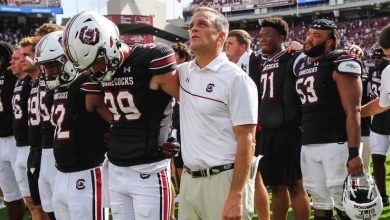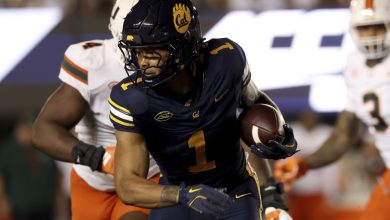Did Auburn football ponder a Hugh Freeze firing in 2024? John Cohen explains

As of January 2024, Auburn University’s football program found itself navigating the often turbulent waters of college football, where coaching changes and performance issues dominate the headlines. Following the 2023 season, there was significant discussion about the future of Auburn’s head coach, Hugh Freeze, and whether the university would consider making a change.
Auburn, known for its passionate fanbase and rich football history, had gone through a difficult stretch in recent years. After firing Bryan Harsin midseason in 2022, Auburn hired Hugh Freeze, a former head coach at Ole Miss, to lead the program in hopes of returning to prominence in the SEC. Freeze, who had previous success coaching at Liberty University, was expected to restore Auburn to its competitive form, particularly in one of the toughest conferences in the country.
However, 2023 was not a smooth ride for Auburn. The team finished the regular season with a mediocre 6-6 record, falling short of expectations in many areas. With the heightened pressure that accompanies being the head coach at Auburn, questions began circulating about Freeze’s future, especially after the disappointing end to the season.
John Cohen, Auburn’s athletic director, played a key role in the decision-making process. He was brought in from Mississippi State to oversee the program’s athletic operations and ensure that Auburn’s football team returned to a competitive and winning environment. Cohen’s experience in managing high-stakes athletic decisions would be tested when it came to evaluating Freeze’s performance.
The Situation Heading into 2024
In analyzing whether Auburn would consider a firing of Hugh Freeze after the 2023 season, there were several key factors to consider. The first was the trajectory of the program under Freeze’s leadership. While the Tigers showed flashes of improvement, there were still clear signs of inconsistency, especially in the highly competitive SEC.
Auburn’s performance in 2023 was underwhelming, particularly in critical games. The team struggled in conference play, where every SEC matchup is a potential battle for bowl eligibility and recruiting advantages. There were also questions about Freeze’s ability to develop a consistent offensive identity and whether his coaching style would truly translate to success in the SEC. The lack of a clear quarterback solution further complicated matters, as Auburn entered a transition period at that key position.
However, Freeze and his staff had faced numerous challenges in building a team in a short amount of time. After taking over in late 2022, Freeze had inherited a roster that was not entirely of his making. Recruiting, roster management, and adapting to the intense demands of SEC football in such a short time span were significant hurdles. Thus, some supporters argued that the program needed more time to develop under Freeze, particularly considering that 2023 was only his first full season.
The second key factor in the decision-making process was Auburn’s athletic department’s willingness to allow Freeze to continue his work. John Cohen, having only recently been hired as athletic director in 2023, was still in the process of shaping his vision for the future of Auburn athletics. Cohen’s background in college athletics at Mississippi State had given him an appreciation for building long-term success rather than making knee-jerk reactions. He had worked with Dan Mullen at Mississippi State and knew the value of stability in a football program. Cohen was well aware of the intense pressure on Auburn’s football team to succeed, but he also understood the importance of allowing coaches time to build a program from the ground up.
Despite the questions about Freeze’s future, Cohen was adamant that the decision would not be based solely on short-term results. In a press conference after the 2023 season concluded, Cohen explained that Auburn was committed to giving Freeze time to turn the program around. He acknowledged that the results in 2023 were not ideal, but he also pointed to the improvement the team showed in certain areas and the foundational work that Freeze was putting into the program.
“We want to be realistic about the process,” Cohen said. “Hugh Freeze has a vision for where this program is going, and we believe in his ability to get us there. It’s not going to be an overnight fix, but we’re committed to allowing him the time to implement his program and build this team the right way.”
Cohen also pointed to the progress in recruiting as an important factor in Freeze’s favor. In a competitive landscape where talent acquisition is critical to success, Freeze had made strides in bringing in highly-rated recruits, especially on the offensive side of the ball. While the results on the field hadn’t yet matched the recruiting efforts, Cohen felt that the foundation was being laid for future success.
Another aspect that helped Freeze’s cause was his history and track record as a coach. Although Freeze had been controversial at times due to his past at Ole Miss and his subsequent time at Liberty, Cohen believed that Freeze was the right person to lead the program through its rebuilding phase. Freeze’s coaching experience in the SEC, along with his ability to turn around programs, was a factor that could not be overlooked.
The decision to retain Freeze through 2024 also had financial implications. Firing a coach after just one season would come with significant costs, both in terms of the buyout clause in Freeze’s contract and the potential disruption it would cause to the program. Auburn’s leadership was keen on avoiding any unnecessary financial burden, especially when considering that the program had already spent money on multiple coaching changes in the past few years.
John Cohen’s Philosophy on Stability and Time
John Cohen was brought to Auburn to provide stability to a program that had seen too much turnover in recent years. Auburn had made three head coaching changes in the previous five years, a level of instability that many viewed as detrimental to the program’s long-term health. With the resources available to Auburn, Cohen understood that a more calculated, patient approach was necessary to build a championship-level program.
Cohen’s philosophy on program development emphasized the importance of continuity. He was aware that Auburn’s football program had experienced a period of volatility, and he was committed to ensuring that Freeze had the time and support needed to build a competitive team. Under Cohen’s leadership, Auburn was aiming to avoid the cyclical nature of hiring and firing coaches that had plagued the program in recent years.
Cohen’s decision to back Freeze for the 2024 season reflected this philosophy. He knew that the decision would not be universally popular, but he also understood that true program-building takes time, particularly in the SEC. If Auburn fired Freeze after just one season, the program would be forced into another coaching search, which could further destabilize the team and potentially set back any progress made.
Looking Ahead to 2024 and Beyond
The 2024 season would be critical for Freeze and his staff. Auburn’s leadership had made it clear that expectations for the team would remain high, but they were not willing to abandon the project after just one season. Freeze would need to show tangible progress in year two, especially in terms of offensive consistency and overall team performance in SEC play.
Auburn’s fanbase, which had grown frustrated with the program’s inability to return to elite status in recent years, would continue to demand results. But for now, Cohen remained resolute in his belief that Freeze was the right man for the job.
“Football is a process, not an event,” Cohen said. “We’re focused on the long-term vision for this program, and we’re excited about where Hugh Freeze is taking us. Auburn football will be back, but we have to be patient.”









